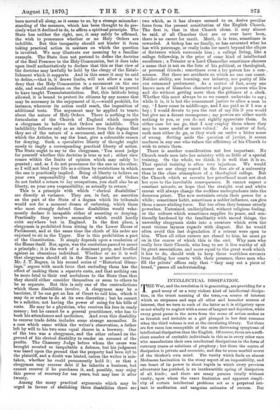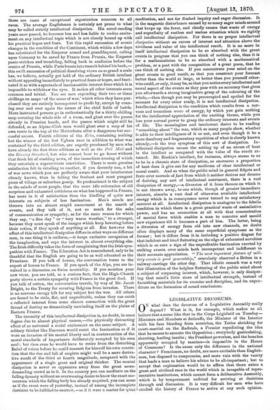INTELLECTUAL DISSIPATION.
THE War, and the revolution it is generating, are providing for a good many of us a very violent kind of intellectual dissipa- tion, in the truest meaning of the term,—a source of interest which so surpasses and saps all other and homelier sources of interest, that we turn to such of the latter as it is obligatory upon us not wholly to neglect with a sense of languor and dejection, while every great pause in the news from the scene of action makes us as feverish and irritable as a girl plunged in her first romance when the third volume is out at the circulating library. Yet there are few races less susceptible of the more distressing symptoms of intellectual dissipation than the English. Of course, there are a suffi- cient number of excitable individuals in this as in every other race who manufacture their own intellectual dissipations in the form of currency crazes or solutions of prophecy ; but there the centre of dissipation is private and eccentric, and due to some morbid secret of the thinker's own mind. The vanity which finds an almost Medusean fascination in the stony aspect of an impossibility, and can boast of its power to shoot rapids in which every previous adventurer has perished, is an inexhaustible spring of dissipation of all kinds ; and there are many persons totally without vanity, upon whom the exact limitation and apparent simpli- city of certain intellectual problems act as a perpetual irri- tant to meditation and sanguine estimates of success. But
these are eases of exceptional organization common to all races. The average Englishman is certainly not prone to what may be called strictly intellectual dissipation. His novel-reading years once passed, he becomes less and less liable to undue excite- ment on any intellectual topic which is not closely bound up with
his practical hopes and fears. Yet this rapid succession of scenic changes in the condition of the Continent, which within a few days has substituted for the Emperor armed and grandiloquent, calling upon Germany to be saved by France from Prussia, the Emperor panic-stricken and trembling, falling back in confusion before the armies of Prussia, while Paris bursts into tumult behind his back,— this swift succession of political dissolving views on so grand a scale has, we believe, actually got hold of the ordinary British intellect without appealing immediately to practical fears or hopes, and fasci- nated it as with a spectacle of inexhaustible interest from which it is impossible to withdraw the eyes. It makes all other interests seem common and trivial. You see men expending their two or three .shillings on maps of the scene of war,' which when they have par- .chased they are entirely incompetent to profit by, except by conn- ing over and over again the names of the chief fields of battle. More instructed persons go in enthusiastically for a thirty-shilling map covering the whole side of a room, and gloat over the passes already in Prussian hands, and the passes which might still be defended, as an Alpine-Club man would gloat over a map of his own route to the top of the Matterhorn after a dangerous but suc- cessful ascent. Fourth editions of the Echo, containing nothing but the winner of the last Egham race in addition to what was contained by the third edition, are eagerly purchased by men who have already the first three editions as well as the Pall Mall and the Evening Standard, but who cannot bear to go home without that fresh bit of startling news, of the immediate coming of which they entertain a superstitious conviction. There is more genuine satisfaction felt in retailing to another, if you decently can, a bit of war news which you are perfectly aware that your interlocutor already knows, than in telling the freshest and most pungent piece of village or suburban gossip. So predominant is the subject in the minds of most people, that the mere idle reiteration of old surprises and exhausted criticisms on what has happened in France, has more in it of satisfaction than the kindling of quite new interests on subjects of less fascination. Men's minds are thrown into an almost stupid amazement at the march of events, and they talk of it, not so much for the sake of communication or sympathy, as for the same reason for which they say, "a fine day "or "very warm weather," to a stranger, because they must speak of the images which keep hovering before their retina, if they speak of anything at all. But however the effect of this intellectual dissipation differs in other ways on different men, in one thing it is uniform,—it keeps exclusive occupation of the imagination, and saps the interest in almost everything else. The Irish difficulty takes the form of complaining that the Irish sym- pathize with France. The Education Act is remembered, only to be thankful that the English are going to be as well educated as the Prussians. If you talk of horses, the conversation turns to the export of horses to France. If you speak of the Alps, you are in- volved in a discussion on Swiss neutrality. If you mention your new vicar, you are told, as a curious fact, that the High-Church party shows a certain sympathy with France in the great duel. If you talk of cotton, the conversation travels, by way of Mr. Jacob Bright, to the Treaty for securing Belgium from invasion. There is no nervous energy left for any subject but the war. All others are found to be stale, flat, and unprofitable, unless they can catch a reflected interest from some chance connection with the great thread of destiny so dramatically unwinding itself on the plains of Eastern France.
The intensity of this intellectual dissipation is, no doubt, in some degree due to almost physical causes,—the physically distracting effect of so universal a social excitement on the same subject. A solitary thinker like Emerson would resist the fascination as if it were an invasion of his mental liberty and in contravention of the moral standards of importance deliberately accepted by his own soul ; but then even he would have to retire from the disturbing Babel of voices before he could reassert for himself his own convic- tion that the rise and fall of empires might well be a mere deriva- tive result of the third or fourth magnitude, compared with the appearance of a single great and original thinker. The mental dissipation is never so oppressive away from the great news- demanding crowd as in it. In the country you can meditate on the falling dynasty without an overweening desire to know the exact mo- mentum which the falling body has already acquired, you can muse as if the event were of yesterday, instead of among the incomplete 1 destinies to be fulfilled to-morrow, —as if it were a matter for quiet
meditation, and not for flushed inquiry and eager discussion. It is the magnetic disturbance caused by so many eager minds around
that keeps up the fever, and chiefly causes that waste of energy and superfluity of restless and useless attention which we rightly call intellectual dissipation. For there is no proper intellectual dissipation without an excess of interest and attention above the vividness and value of the intellectual result. It is no more in itself intellectual dissipation to be so absorbed with the great events in progress that you can think of nothing else, than it is for a mathematician to be so absorbed with a mathematical problem, or a poet with the composition of a great poem, that he can think of nothing else. If you concentrate your mind on the great events to good result, so that you construct your forecast better than the world at large, or better than you yourself other- wise could, or only, it may be, so that you notice every intellectual and moral aspect of the events as they pass with an accuracy that gives you afterwards a strong imaginative grasp of the colouring of the whole,—then though you may be preoccupied and spoiled for the moment for every other study, it is not intellectual dissipation. Intellectual dissipation is the condition which results from a ner- vous and tremulous waste of energy, by which you gain nothing for the intellectual appreciation of the exciting theme, while you lose your normal power to grasp the ordinary interests and events of life. The meaningless and incoherent desire to be reading "something about" the war, which so many people show, whether it adds to their intelligence of it or not, and even though it be a mere desultory and fragmentary repetition of what is clearly known already,—is the true symptom of this sort of dissipation. In- tellectual dissipation means the setting up of an excess of heat in the intellect as compared with the value of the result at- tained. Mr. Ruskin's intellect, for instance, always seems to us to be in a chronic state of dissipation, so enormous a proportion of heat does it give out for any modicum of clear intellectual or moral result. And so when the public mind in general fidgets and frets over morsels offset from which it neither derives nor dreams of deriving any sort of intellectual nutriment, there is a real dissipation of energy,—a diversion of it from themes on which it is not thrown away, to one which, though of greater immediate interest, absorbs a vast deal of otherwise available intellectual energy which is in consequence never turned to any satisfactory account at all. Intellectual dissipation is analogous to the febrile condition in which there is a great practical waste of assimilative power, and has no connection at all with that concentration of mental force which enables a man to conceive and mould new experience till it becomes a part of him. The latter, being a diversion of energy from old into new channels, no doubt often displays many of the same superficial symptoms as the former ; but it differs from it in including a positive disgust for that indolent and tired fluttering on the edge of exhausted novelties which is so sure a sign of the unprofitable fascination exerted by striking events over minds both incompetent and indifferent to their accurate appreciation. "The most important feature of mili- tary events is good generalship," oracularly observed a Briton in a railway-carriage the other day. That idiotic remark was a very fair illustration of the helpless fluttering of the public mind about a subject of surpassing interest, which, however, is only dissipat- ing that mind's little store of intellectual strength, instead of furnishing materials for its exercise and discipline, and its expen- diture on the formation of sound conclusions.































 Previous page
Previous page